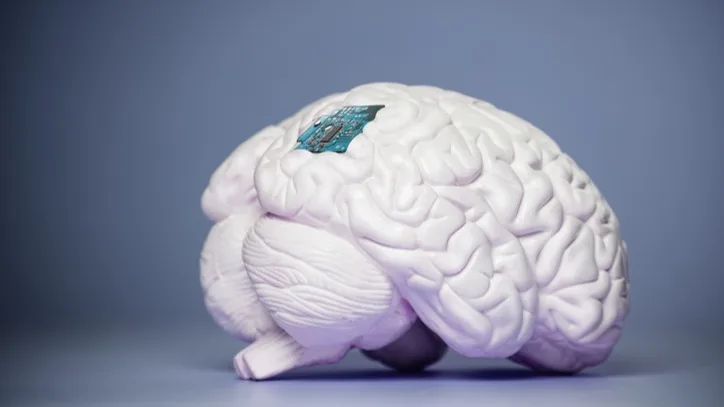
Overview
Companies and medical centers are increasingly looking at how inserting computer chips in the brain can help patients recover from a variety of conditions, in a market expected to hit $12 billion in the next decade.
More than 70 Studies are Testing how Computer Chips in and Around the Brain will Impact Patient Care
Once defined as science fiction, inserting computer chips into the brain to help overcome disease and disability is rapidly becoming a reality in modern medicine.
Last week, Precision Neuroscience announced it had received FDA clearance for what it calls the first-of-its-kind wireless brain implant designed to record and stimulate brain activity. The device, a thin sheet of electrodes that rests on the brain’s surface, is intended for short-term use during neurosurgical procedures.
“Our mission is to deliver life-changing brain–computer interface technology to the millions of people who stand to benefit from it,” said Michael Mager, Precision's CEO and Co-Founder, in a news release. “This clearance represents a big step forward toward that goal.”
Precision is one of many companies exploring the space. From restoring motor function to enabling communication for people who can no longer speak, clinical trials using brain-computer interface (BCI) devices are rapidly expanding across a range of health conditions.
Investors and innovators are taking note – the projected size of the market for these devices is expected to grow from $2.9 billion this year to $12 billion in the next decade, according to Precedence Research.
BCI is also increasingly being showcased at major conferences and events – in January, several companies active in this space received innovator awards at CES, the world’s largest consumer electronics event, for their products (see “Neurotech Steps into the Spotlight at CES 2025”).
And last month, at Nvidia’s big developer conference in Silicon Valley, the company’s Vice President of Healthcare and Life Sciences, Kimberly Powell, highlighted footage during her keynote address on how this technology by Synchron allowed a paralyzed man to control a computer through thought alone (read “Nvidia Unveils AI Agents for Labs, Clinics and Trials.”)
More than 70 clinical trials examine BCI technologies
An analysis of active medical studies on ClinicalTrials.Gov shows more than 70 clinical trials currently testing BCI devices. These trials are evaulating the technology in conditions including stroke, motor impairment and neurorehabilitation as well mental health areas like depression. The average trial size is enrolling over 40 patients, with the largest study seeking 400 participants.
These studies reflect growing interest in seeing whether BCI systems can support the brain’s ability to adapt and recover, going beyond simple observation to active rehabilitation.
By providing real-time feedback and stimulation, some devices are being designed to actively engage the brain’s natural capacity to adapt and reorganize — what scientists call neuroplasticity. That means BCIs could eventually support not just communication or monitoring, but rehabilitation and recovery of lost functions.
Stroke rehabilitation at the forefront for BCI tech testing
A significant number of trials target stroke rehabilitation, often using closed-loop systems that provide real-time feedback to guide patient recovery. One clinical trial led by The Hong Kong Polytechnic University, is testing whether a BCI can help stroke survivors regain movement in their arms by encouraging parts of the brain involved in imitation and motor learning to become more active.
While the largest segment of the trials analyzed are focused on movement recovery, several others are exploring how these systems could serve as communication aids for individuals with speech and movement impairments. Oregon Health and Science University is running a study called BCI-FIT, which adapts brain signals and natural language processing to personalize typing interfaces for people with severe speech and physical impairments.
Mental health is also emerging as a new frontier. The largest trial in the dataset, involving 400 participants and sponsored by Shanghai Mental Health Center, is testing a noninvasive BCI system to help individuals with depression and bipolar disorder. The goal is to evaluate whether brain-controlled applications can provide therapeutic benefit for mood regulation, particularly in people with treatment-resistant forms of the disease.
“In terms of treatment, medication remains the main stream for [major depressive disorder],” according to the study description. “Although current methods have certain therapeutic effects, patients still suffer from various side effects and poor cognitive function…there is an urgent need to search for neurobiological markers in depression and develop targeted non-invasive intervention technologies.”








